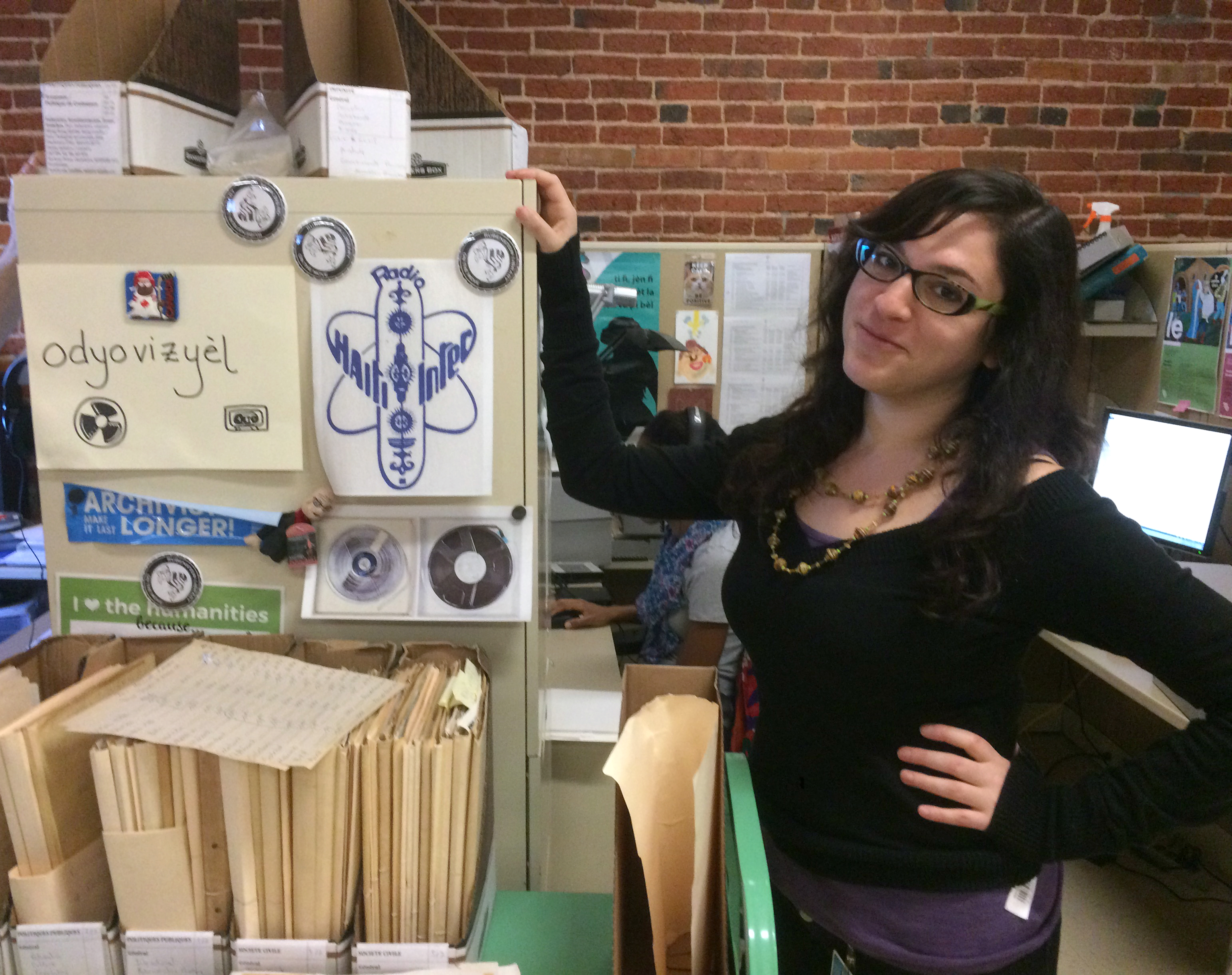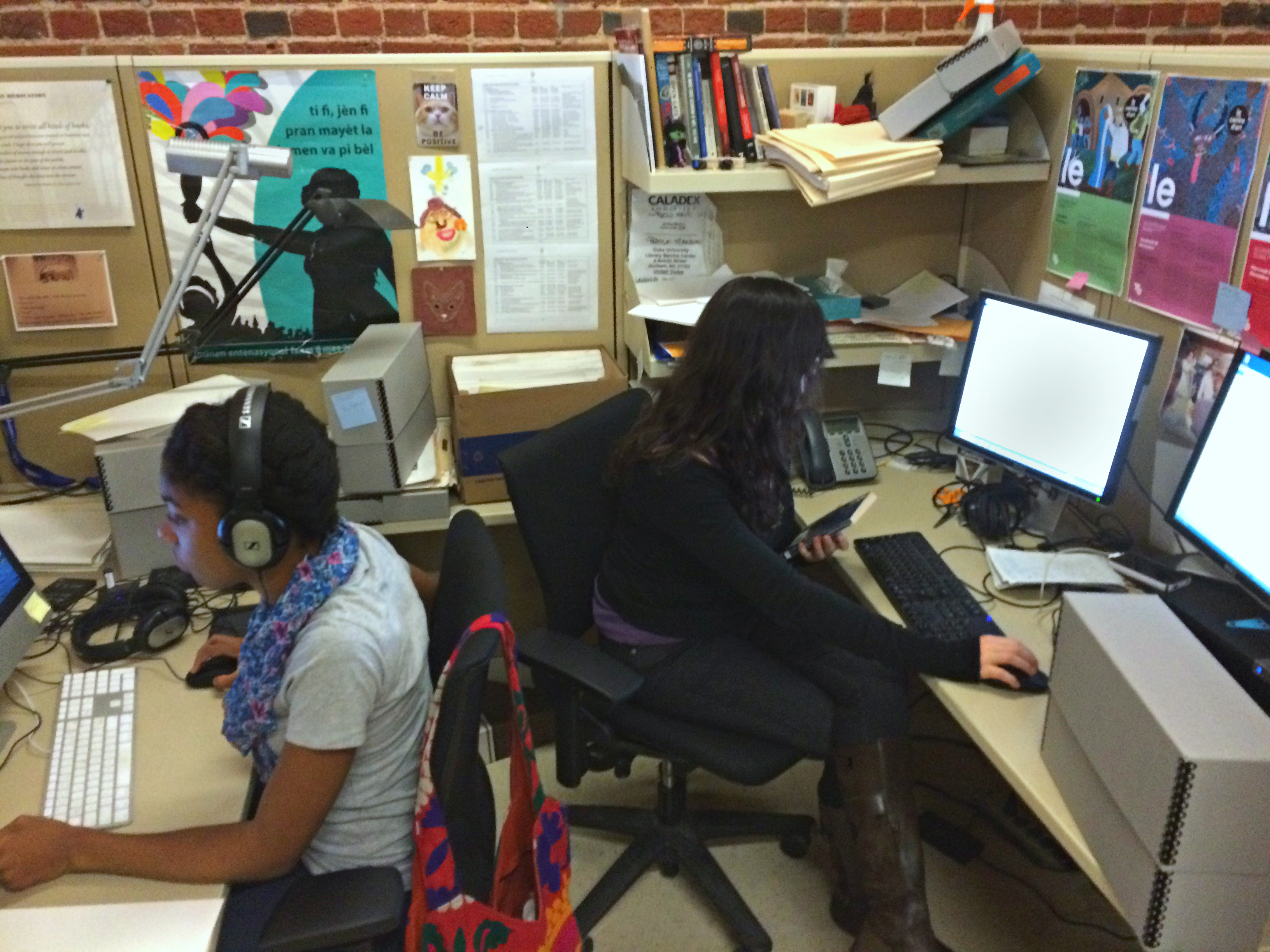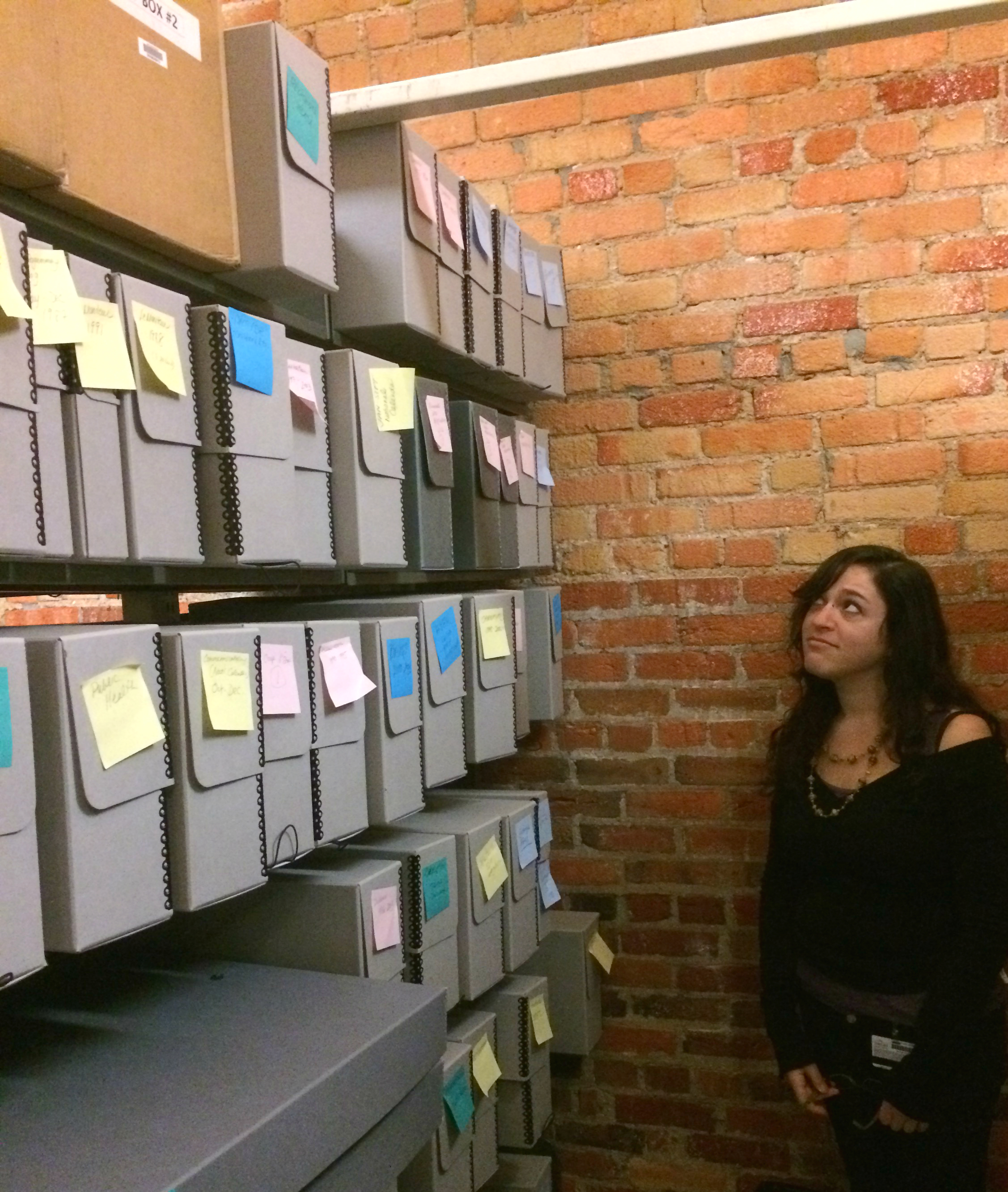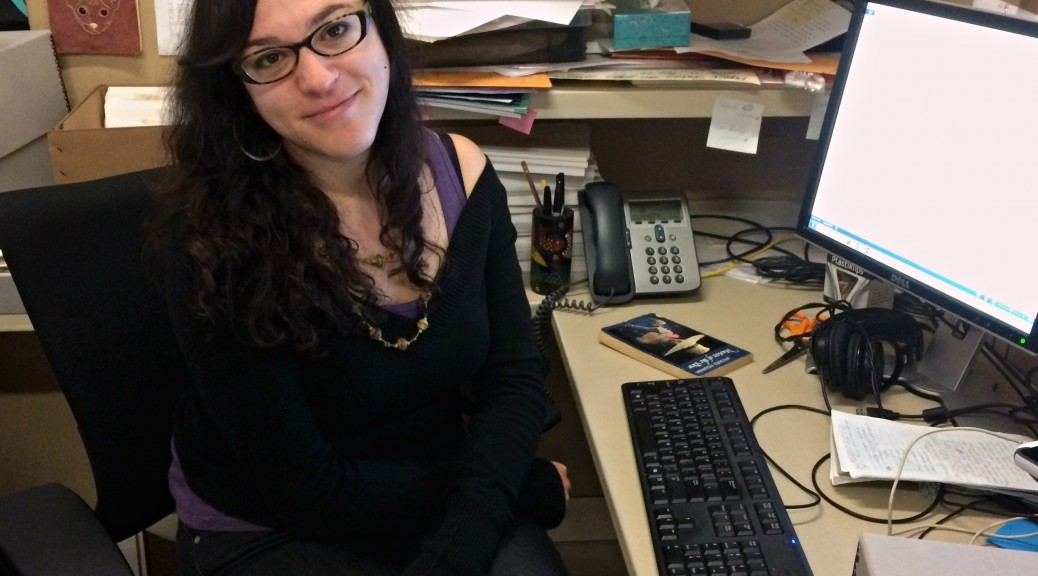Laura Wagner is the Project Archivist for the Radio Haiti Archives. She joined the Rubenstein in 2015. She has a PhD in anthropology from UNC. Her dissertation is about the 2010 earthquake and its long aftermath: how did people’s everyday lives and social worlds change (or not change) in the wake of the disaster and displacement? How do people get by in an aid economy? How did Haitian people and non-Haitian interveners make sense of the humanitarian response and its failures? She also wrote a YA novel, Hold Tight, Don’t Let Go , which deals with some of the same issues. Her interests include Haiti, literary fiction and nonfiction, humanitarianism, human rights, and social justice. She has been a frequent contributor to the Devil’s Tale since joining the RL.
How do you describe what you do to people you meet at a party? To fellow librarians and library staff?
At parties I say “I work on the archives of Haiti’s first independent radio station.” Then that confuses them and they think I’m doing research in the archives, and I have to clarify that I’m processing the materials. Then they generally want to know why these materials live at Duke. And if I’m at a party in Haiti, people then want to talk to about their own memories of Radio Haiti and of Jean Dominique, and they ask me if the station will ever reopen. To librarians and library staff, I say I’m a project archivist who never trained as an archivist.
What led you to working in libraries?
This project. I had never worked in a library before. I began working on this project as an external contractor for the Forum for Scholars and Publics, which was collaborating with the Library to create a public-facing pilot website with a small sample of the Radio Haiti recordings. When the opportunity to apply for the Project Archivist job came along, I applied. I had already decided that if it was possible, I wanted to work on this project full time. Temperamentally and experientially, I am probably a bit of an outlier among the library set.
Tell us about your relationship to Radio Haiti. How has it evolved since taking on this position?
Jean Dominique, Michèle Montas, and other members of the Radio Haiti team had numbered among my heroes since I first started learning about Haiti and learning Haitian Creole, back in 2004. I never could have imagined that one day I would have the opportunity to work on preserving the work of Radio Haiti. The first time I met Michèle, in April 2014, I was embarrassingly giddy. It is a huge honor to work on this project.
I’m learning a lot about late twentieth century Haiti, in a very granular way. I already knew the major events and trends, the main themes, but always analytically and in hindsight. It’s a very different experience to learn about events through real-time, day-to-day reporting, done by people who did not yet know the outcome of the story. It’s fascinating, but also often sad and frustrating because you see the same things happening over and over and over again, until today. The same injustices, the same impunity, though sometimes it “repaints its face”, to use a phrase that Jean Dominique uses.
How does your work at the Rubenstein influence your approach to research and writing?
I was a researcher and writer before I started working on this project, so I have to keep myself in check; I cannot follow my instincts and desires by letting myself act as a researcher and writer when my job, for the moment, is to be processing the archive. That said, I hope to someday write something substantial about this archive. I can also say that my experience as a researcher and writer influences my approach to processing this archive. I want it all to be clear and transparent; I want to provide context and thematic guidance for future researchers and listeners. Working on the Radio Haiti archive has been a huge learning experience for me, and I want to impart as much of that knowledge as possible to others down the line, by incorporating that knowledge into the structure and description of the archive.

What does an average day at RL look like for you?
Because this is a single project with a clear goal and endpoint, and with defined stages, my typical workday varies depending on what we’re working on. These days I am mostly working through Radio Haiti’s paper archive. So I get to work, answer some email, and start organizing the papers, removing the faded invisible Thermofax pages, sorting them by subject and year. I have two excellent undergraduate assistants this semester, both Haitian, who are starting to listen to and describe some of the recordings. I am very eager to finish processing the papers so I can focus on the audio full-time. I also spend part of the day thinking about broader questions of access — how we’re going to make this collection as available and accessible as possible to people in Haiti, given the social and infrastructural realities there. I am very eager to begin working on the recordings full-time, of course.

What do you like best about your job? What excites you most?
What excites me the most is that I am helping keep this important work alive, making it accessible to people in Haiti and beyond. And I just really like the experience of listening to the recordings. Sometimes it’s hard for me to listen as an archivist, rather than as a researcher and writer. So it’s fun when I get to write a blog entry about the project, and synthesize and put together different parts of the archive, translate some excerpts, and provide context to people who may not already know the story of Radio Haiti. As I said, it’s a great honor to work on this collection, to be entrusted with this collection. As Michèle says, part of Jean’s soul is here.
What might people find surprising about your job?
I think it depends on the person. For people who aren’t used to processing archival collections (id est most people), I think they’d be surprised at how much physical restoration, intellectual labor and time this job takes. A lot of people want the Radio Haiti collection to be available as soon as possible. (I’m one of them!) And many people don’t understand why we can’t do it instantly.
What is the most challenging aspect of your job?
I have two answers to that, which are sort of incommensurate with one another. In a day-to-day sense, it can be tedious, and I sometimes feel isolated in this work. Radio Haiti itself was a team effort — it was a social, collaborative, interactive entity, an act of ongoing solidarity, both in terms of the journalists and their audience… and the audience was nearly all of Haiti. So engaging with that work in my cubicle in a converted tobacco warehouse in Durham, North Carolina, can feel lonely. At the same time, I feel connected to the people who appear in the tapes, across time and space, even across life and death. Which brings me to the second challenging aspect of this job, which is actually the same as my favorite thing about the job: the weight of history, the weight of memory. This collection is a huge part of Haitian national heritage. And so much of it is sad, frustrating and infuriating — there is so much injustice, suffering, and absurdity in this archive. Sometimes it’s emotionally difficult to listen to these things — though Jean Dominique’s incisive intellect and humor make it easier. It sounds strange, but I laugh all the time.

Do you have a favorite piece or collection at The Rubenstein? Why?
Well, the Radio Haiti collection is obviously my favorite collection, for all the reasons I’ve mentioned. I’m not intimately familiar with the other collections, but the National Coalition for Haitian Rights archive has some fascinating material in it that often complements the Radio Haiti collection. And I like all the History of Medicine collections, especially Benjamin Rush papers, which are poignant, and the creepy suede baby + placenta.
Where can you be found when you’re not working?
Cooking dinner with friends, baking cakes, drinking a beer, vaguely working on novel #2, vaguely revising my dissertation, singing in the car, asking my cats why they are thundering hither and yon at 2 am. I like making silly little greeting cards for friends; I’ve been thinking about taking an actual art class or something. I’d like to know how to access all the other seasons of the Great British Baking Show. And I’ve started running as of late, at which I am truly mediocre. It’s liberating to do something you know you have no hope of being good at.
What book is on your nightstand/in your carryall right now?
There’s a stack! I’ve been slowly savoring the Complete Stories of Clarice Lispector for a few weeks, but it’s a bit heavy to carry around.
Interview conducted and edited by Katrina Martin.
The processing of the Radio Haiti Archive and the Radio Haiti Archive digital collection were made possible through grants from the National Endowment for the Humanities.




I wish you well in this endeavor and hope you release your findings to the world to share. The Diaspora and respective radio stations will be happy to discuss the work. We all loved Dominque.
Good luck and God Bless.